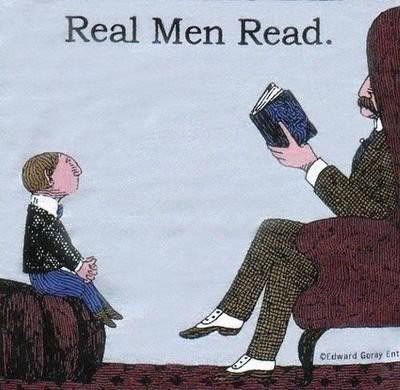 (illustration by the late, great, Edward Gorey, of course) 18. Men and Cartoons by Jonathan Lethem This collection of short fiction is really quite something. It seems like Lethem might have set himself the task of writing different genres, like perhaps he thought, I'll write a few poignant contemporary stories with a tie-in to Marvel comics, or comix artists; I'll write one futuristic hard-boiled detective story; a couple magical realist story; a story about a lesser superhero past his prime; an epistolary story; a futuristic SF novella on a Classical theme; a magical realist satire of reality TV complete with wisecracking giant crab - except the writing is seamless, and isn't in the least contrived. Surprising, clever, funny, poignant and generally amazing, this is a man who can invent the Sylvia Plath Sheep (a dystopianist's nightmare of genetic engineering and suicide studies) and have it be hilarious, and make a story, ostensibly about traffic in New York, and it is chilling. Read it.
(illustration by the late, great, Edward Gorey, of course) 18. Men and Cartoons by Jonathan Lethem This collection of short fiction is really quite something. It seems like Lethem might have set himself the task of writing different genres, like perhaps he thought, I'll write a few poignant contemporary stories with a tie-in to Marvel comics, or comix artists; I'll write one futuristic hard-boiled detective story; a couple magical realist story; a story about a lesser superhero past his prime; an epistolary story; a futuristic SF novella on a Classical theme; a magical realist satire of reality TV complete with wisecracking giant crab - except the writing is seamless, and isn't in the least contrived. Surprising, clever, funny, poignant and generally amazing, this is a man who can invent the Sylvia Plath Sheep (a dystopianist's nightmare of genetic engineering and suicide studies) and have it be hilarious, and make a story, ostensibly about traffic in New York, and it is chilling. Read it.19. Crime and Punishment by Fyodor Dostoyevsky No, really. You get a lot of strange reactions reading this book. The streetcar driver was quite incredulous. My mother acted like I was a masochist. Though, the story is quite exciting. It's a crime thriller, really. Then, in the second chapter of Epilogue the entire novel is suddenly revealed as some sort of Christian novel of the Augustinian ilk - but that isn't a strike against it. It is what it is. Without revealing too much of the plot, whether you've read the novel or not, you may know that it's the story of Raskolnikov, a penniless former student, who decides to kill his pawnbroker, and when interrupted, kills her innocent sister as well. This happens early in the novel. The 500 or so subsequent pages are what happens to his psyche, his family, his friends, associates and a second family, the Marmeladov family, with whom he becomes embroiled. The characterization and psychological portraits are excellent. There are foils and pairings of the introvert Raskolnikov and his wonderful, devoted, extrovert friend Razumikhin, between his honourable, virginal sister Dunia, who financially supports the family as a governess, and the fallen yet saintly prostitute Sonia (the holy fool) who supports the Marmeladovs. It reminded me of reading Patricia Highsmith's The Talented Mr. Ripley. Clearly Highsmith was influenced by Dostoyevsky - telling the story from largely the killer's perspective (though in the 3rd person). However, I found Raskolnikov largely unlikeable. Ripley for all his problems - and let's face it - he's a psychopath - is strangely engaging (perhaps like TV's Dexter). When we studied The Talented Mr. Ripley in Detective Fiction, a student who was on a parole board in England, made a presentation. She explained that a psychopath is an adrenaline junkie - only in dangerous situations, with heightened adrenaline, does he feel normal. Reading Crime and Punishment, I concluded that Raskonikov is a psychopath (though I don't think, despite the wise psychological portrayal, this was what Dostoyevsky intended me to think). Not only does he commit these murders, but time and again, he puts himself in dangerous situations - revisiting the scene of the crime, inviting people to take him to the police, going outside despite fever, taunting police officers, being rude to his sister's fiancé who could help him financially (though, admittedly Luzhin ultimately proves himself to be worthy of contempt, he had not yet done so), generally making scenes, rejecting help. Raskolnikov is also immensely generous, even in abject poverty, but I dispute the claim in the introduction that he has "the compassion of the Buddha"; he is perpetually judging people and complaining about being tormented. That's not compassion. Even his generosity irked me somewhat - he was giving away money his mother borrowed against her pension or money his sister earned as a governess in a hostile environment. There is a lot of insight into the role of women in late 19th century Russia, the socioeconomics, the ravages of alcoholism, forensic psychology, psychology and dreams, St. Petersburg society and ultimately, both friendship and love. Regretably, it's marred by occasional senseless antisemitic comments. It is nonetheless one of those works of literature which stand the test of time.
{Series so far: books read, more books read, books read, books read continues, more books read, I, II, III, IV, V, VI, VII, VIII, IX, X, XI, XII, XIII, XIV, XV, XVI, XVII, XVIII,XIX, XX, XXI, XXII, XXIII XXIV, XXV, XXVI, XXVII, XXVIII, XXIX, XXX, XXXI, XXXII, XXXIII, XXXIV, XXXV}









No comments:
Post a Comment